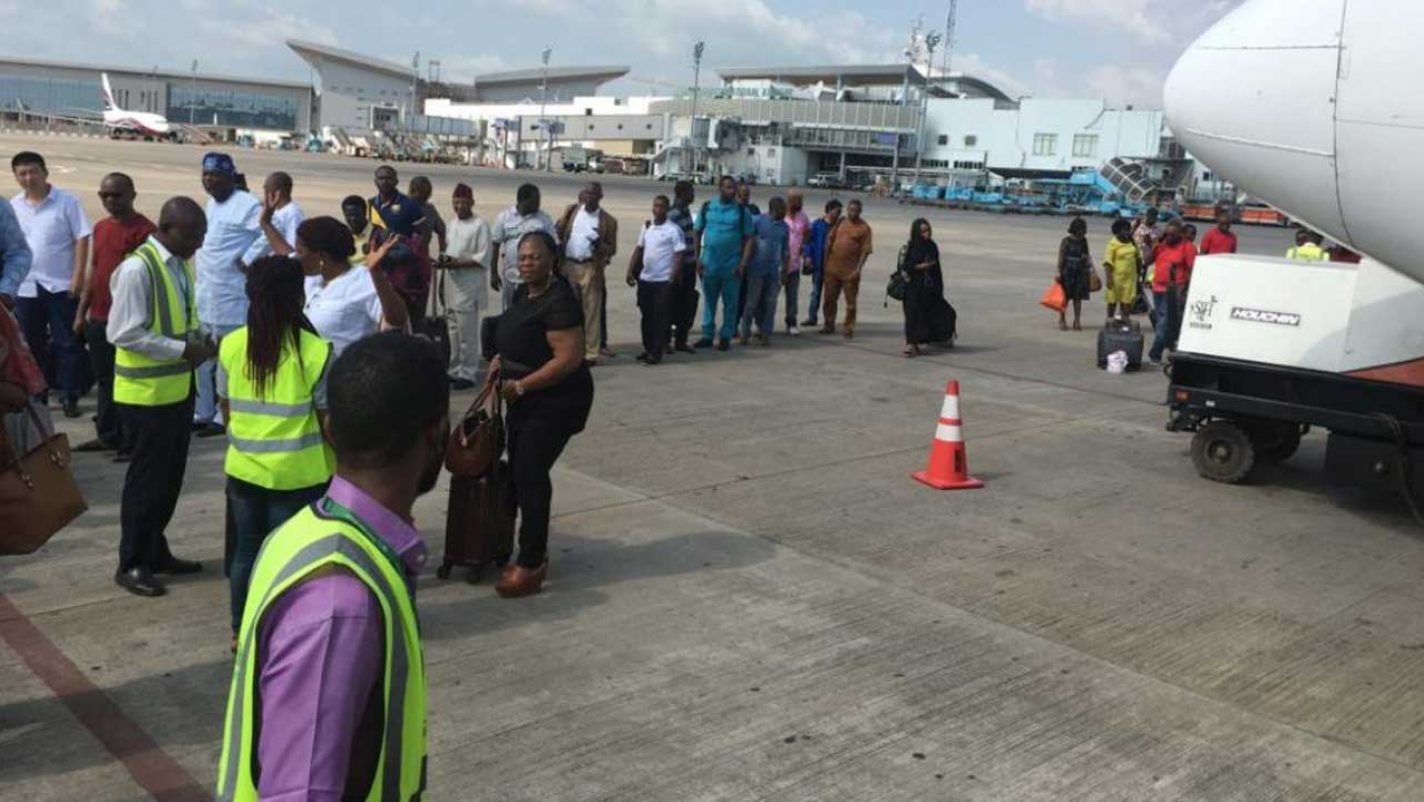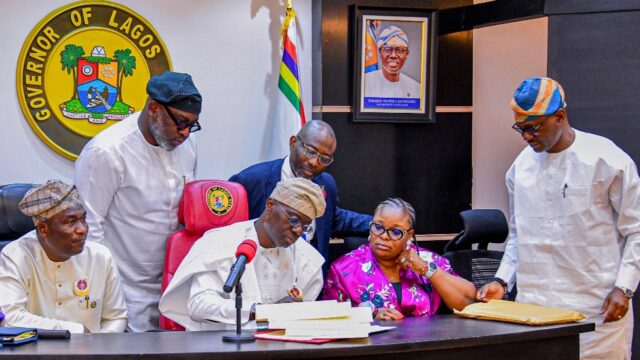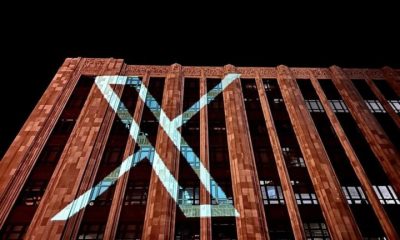Business
Aviation unions abandon NLC warning strike as NCAA orders workers to report to duty

Unions in the Nigerian aviation industry have opted out of the two-day warning strike called by the Nigeria Labour Congress (NLC) over the removal of subsidy on fuel.
This is as the Nigeria Civil Aviation Authority (NCAA) has directed its member of staff to resume work as usual, saying that failure to comply with the directive would be taken as sabotage against the ongoing International Civil Aviation Organisation (ICAO) Universal Safety Oversight Programme (USOAP).
The unions under the NLC in the sector; the Association of Nigeria Aviation Professionals (ANAP), the National Association of Aircraft Pilots and Engineers (NAAPE), and the National Union of Air Transport Employees (NUATE), said they won’t participate in the warning strike due to the ICAO audit, but insisted that they never attempted to sabotage NLC.
Comrade Abdulrazak Saidu, the General Secretary, of ANAP, told our correspondent on Tuesday that the warning strike may affect the chances of Nigeria’s scaling the ICAO audit.
He said that the decision of the union to opt out of the two-day warning strike was taken after a review of the internal situation in the industry and its consequences.
He also said that the union wanted to protect Nigeria from being sanctioned by the global aviation body.
He said:
- “The aviation union decided not to comply fully with the directive of the National Executive Council (NEC) of NLC so that the ICAO auditors already in the country would be able to carry out their assignment without disruption.
- “NLC NEC has taken the decision and directed all affiliates to mobilize for the two-day warning strike beginning tomorrow (Tuesday). In line with the directive of the NEC NLC, we have issued a circular to that effect in the Aviation industry. However, after a wide range of consultations in that regard, and considering the volatile and international nature of the aviation industry and best practices, we have discovered that the warning strike will negatively affect the ongoing audit of aviation facilities in the country.
- “Given this development, we cannot allow the disruption of the ongoing 10 days audit to cause Nigeria to be sanctioned by the international aviation body. Therefore, all normal activities, regarding Aviation business should continue uninterrupted.”
Also, the Air Transport Staff Senior Services Association of Nigeria (ATSSSAN), said it would not be a part of the warning strike, saying its parent body, Trade Union Congress (TUC) was not ready for a strike.
Comrade Frances Akinjole, General Secretary, ATSSSAN, told our correspondent that the leadership of the congress posited that negotiations with the government had not broken down irretrievably.
He said that its members were encouraged to use their best endeavours to avoid every situation that could lead to friction among workers at workplaces.
He added:
- “This ugly division is not going to be a permanent phenomenon. We shall not allow decisions of the whole to destroy our solidarity in the aviation sector.
- “Painfully, it is not our decision! We are not cowards!”
Besides, a circular to all staff, signed by the Director, Human Resources and Admin, NCAA, dated September 4, 2023, with the reference number: NCAA/DHR&A/03/1549/1/163 and obtained by newsmen, directed all members of staff of the agency to report to their duty post.
The circular warned that failure to comply would be taken as sabotage to the ongoing ICAO safety audit of the industry.
The circular reiterated that the importance of the ongoing audit in the aviation industry should not be over-emphasized.
Business
Ghana’s inflation rises to 23.8% — highest in eight months

Ghana’s consumer inflation rate rose for the fourth consecutive month to 23.8 percent in December 2024.
Samuel Kobina Annim, government statistician at the Ghana Statistical Service (GSS), announced the figure to journalists in Accra on Wednesday.
Ghana’s inflation rate started rising in September last year, when it rose to 21.5 percent, then climbed further to 22.1 percent in October and 23 percent in November.
Annim said the inflation rate recorded at the end of last year was the highest in eight months.
“The rate of inflation… is the third highest in the last 13 months and highest in the last eight months,” Annim said.
Also, food inflation saw a significant jump, rising from 25.9 percent in November to 27.8 percent in December.
Annim attributed the increase to the contributions from specific food items, such as yams, showing drastic year-on-year price hikes of 63.3 percent.
He also highlighted the need for a dual approach to tackling inflation, addressing both monetary and real-sector issues.
“We do emphasise that there are two perspectives in addressing inflation. One is the monetary side… and the other is the real side, with what we’ve seen with food inflation, more particularly the food that we consume, that are locally produced,” he added.
Annim urged policymakers to focus on production, value chains, transportation, warehousing, and reducing post-harvest losses to stabilise food prices.
“Policymakers put in diverse interventions, rather than focusing on, let’s say, only exchange rate or focusing on just some selected items that do not cover the variety of food items that influence food prices,” he said.
Business
Governor Sanwo-olu signs N3.366trn 2025 budget

Lagos State Governor, Babajide Sanwo-Olu, on Thursday, signed the 2025 appropriation bill into law.
The Special Adviser on Media and Publicity to the Governor, Gboyega Akosile, made this known in a post on his X handle.
He said the budget size is N3.366 trillion meant for the continuation of the great works of the Sanwo-Olu administration.
Business
Italy extends work visa for skilled workers for 2025

Italy is taking steps to address its significant shortage of skilled workers by keeping its Work Visa for Highly Qualified Workers program open for 2025.
The country, which is known for its rich culture, food, and history, has faced increasing demand in sectors such as IT, healthcare, and green energy.
These industries are crucial to Italy’s economic growth, and the government is working to meet these demands by attracting foreign talent.
Italy is making considerable efforts to improve its labour market by introducing a series of policy changes to simplify the visa application process, DAAD Scholarship reports. The country’s Work Visa program is designed to bridge the gap between the available talent and the growing need for highly skilled workers.
Italy’s work visa aims to address skill shortages
The Work Visa for Highly Qualified Workers aims to address the skill shortages in key sectors, including information and communication technology (ICT), healthcare, and renewable energy. By opening its doors to foreign professionals, Italy hopes to fill critical positions that are difficult to staff with local workers.
This program is expected to boost the economy by bringing in skilled professionals who can contribute to sectors vital to Italy’s long-term economic stability.
The visa allows skilled workers to live and work in Italy while helping the country meet its industrial needs. In 2025, the visa is seen as a way to attract experts from around the world who can fill gaps in sectors where there is a high demand for specialized knowledge and experience.
Key changes to Italy’s work visa policies for 2025
Significant changes have been made to the Italian Work Visa policies to streamline the application process and ensure faster processing times. One of the major updates is the increase in quotas for non-EU workers.
- Last year, the Italian government raised the quota for work permits from 151,000 to 165,000. This adjustment reflects the increasing need for foreign workers across multiple sectors.
- Another notable change is the introduction of digital processes to simplify the visa application. By March 2024, the Italian government implemented digital contracts and the use of certified email (PEC), which have reduced the need for in-person visits to immigration offices.
- In July 2024, Italy also revised its EU Blue Card requirements, lowering the minimum work contract duration from 12 months to six months. Additionally, the salary threshold was adjusted to fall between 1 and 1.6 times the average gross salary in Italy.
The introduction of sector-specific permits for healthcare roles also occurred in October 2024. An additional 10,000 permits were introduced for family and social healthcare assistance positions to meet the growing demand in the healthcare sector.
Streamlined application process for 2025 work visa
The new application process for the Work Visa for Highly Qualified Workers in 2025 is designed to be faster and more accessible. The digital system allows employers to pre-fill applications for their workers, saving time and reducing paperwork.
The application process is simplified, with designated “click days” for submission, including February 5th, 7th, and 12th, 2025, depending on the applicant’s category, reports inform.
Once an application is submitted, both the employer and the applicant will be notified of the decision within a specified timeframe. Digital contracts and integration agreements also reduce the need for physical paperwork, further speeding up the process.
High-demand sectors for Italy’s work visa program
The Italian Work Visa for Highly Qualified Workers targets skilled professionals in several key sectors. These include:
- ICT: Software developers, data analysts, AI specialists, and cybersecurity experts are highly sought after.
- Healthcare: Nurses, physiotherapists, caregivers, and healthcare assistants are in demand.
- Green Energy: Engineers focused on renewable energy are needed to help Italy meet sustainability goals.
- Construction: Skilled laborers, engineers, and project managers are sought to address Italy’s infrastructure needs.
- Hospitality: Chefs, hotel managers, and tourism professionals are needed to support Italy’s vibrant tourism industry.
Where to find jobs with visa sponsorship in Italy
For those looking to apply for the Work Visa for Highly Qualified Workers, several job portals can help candidates find employment in Italy. Some popular websites where job seekers can find roles with visa sponsorship include:
The program offers a valuable opportunity for professionals in high-demand sectors to contribute to Italy’s economy and enjoy living in one of Europe’s most attractive countries.
-

 Business1 week ago
Business1 week agoAir France deboards French national in Abuja airport for unruly behaviour
-

 Entertainment1 week ago
Entertainment1 week agoLala Akindoju loses dad
-

 News1 week ago
News1 week ago‘He’s a dead man walking’ — military threatens to eliminate Bello Turji
-

 News1 week ago
News1 week agoCelebrating Excellence in Nigeria: The Icons of Resilience, Leadership, and Innovation in 2024!
-

 News1 week ago
News1 week agoLagos state government to probe DJ Kulet’s husband over child molestation allegations
-

 Business1 week ago
Business1 week agoX to launch payment system this year
-

 News1 week ago
News1 week agoFire razes police station, three buildings in Lagos
-

 News1 week ago
News1 week agoUNIMEDTH resident doctors in Ondo begin indefinite strike over poor conditions of service


















